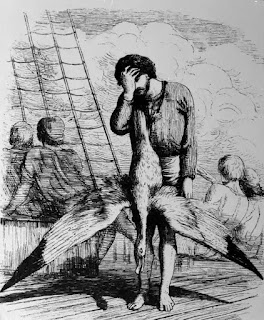It was one of those literary works dubbed "classics" that high-school students in my day were required to read and study, even though we ourselves would never have chosen it for our reading entertainment. It was the exotic, multi-page poem "The Rime of the Ancient Mariner" by Samuel Taylor Coleridge (1772-1834). Even today, literary critics recognize Coleridge as having been one of the most insightful minds of his time.
 |
| The dead albatross hangs from the mariner's neck. |
We high-schoolers, knowing we could not escape from the Ancient-Mariner poem, set our minds to finding some intriguing elements in that famous literary work. We latched onto the bizarre plot development of the sailor in the poem having a dead albatross hung around his neck as a punishment. We tried to enjoy Coleridge's rhythm and alliteration in some of the stanzas we memorized. For example, here is the description of the plight of the thirsty sailors when their sailing-ship becomes stranded on a windless ocean of undrinkable saltwater, the boards of the ship's deck even shrinking under the hot sun:
"Water, water everywhere,
And all the boards did shrink;
Water, water everywhere
Nor any drop to drink."
Those lines popped into my head when I was reflecting upon some of the disturbing news events during the summer of 2022. In Kentucky, freak floods occurred day after day, killing many. At the same time, in the southwest of the U.S., the level of the Colorado River -- which several states depended upon for water -- had reached a record low. Affected by climate change, the news about water was either "too much" or "too little."
There thus has been no escape from being concerned about water. Even astronomers were searching for signs of it on far-off planets as evidence of the possibility of life elsewhere than on Earth. Along with biologists, astronomers know that the common denominator of all forms of life we know about is water -- that remarkable liquid formed when atoms of the gas hydrogen and the gas oxygen bond together.
The common interest in water during the summer of 2022 (from the people of Kentucky to those living in the Southwest to even astronomers) was a contrast to most of the sentiments expressed publicly during that year. More common had been polarized views that suggested that half of the population of people in the U.S. had nothing at all in common with the other half. But water -- in some way -- became a common concern
 |
Mariner shoots
the albatross
with his crossbow |
Why had the mariner's ship become stymied on a windless ocean? The answer goes back to why that albatross had been hung around the mariner's neck as a punishment. He had, for no reason, recklessly shot that great white bird that had been accompanying the ship for several days "for food or play." The mariner had disregarded the fact that the presence of an albatross had traditionally been considered by sailors to be a good omen. The poem suggests that there are moral laws to the universe that set limits which humans cannot pass without ensuing consequences.
Samuel Taylor Coleridge wrote at a time when poetry tended to moralize more than it does today. Nevertheless, if he were writing his tale of the mariner today, I would hope he would still include in its final stanzas another set of lines we memorized in high school.
They go like this:
"He prayeth well, who loveth well
Both man and bird and beast.
He prayeth best, who loveth best
All things both great and small;
For the dear God who loveth us,
He made and loveth all."
~ ~ ~
(Do any of the lines of Coleridge spark any thoughts or feelings in you?)
(All quotations are from Coleridge's "The Rime of the Ancient Mariner"
taken from The Norton Anthology of English Literature, edited by M.H. Abrams, et al., ©1968.)
(Both pictures are in the public domain.)










